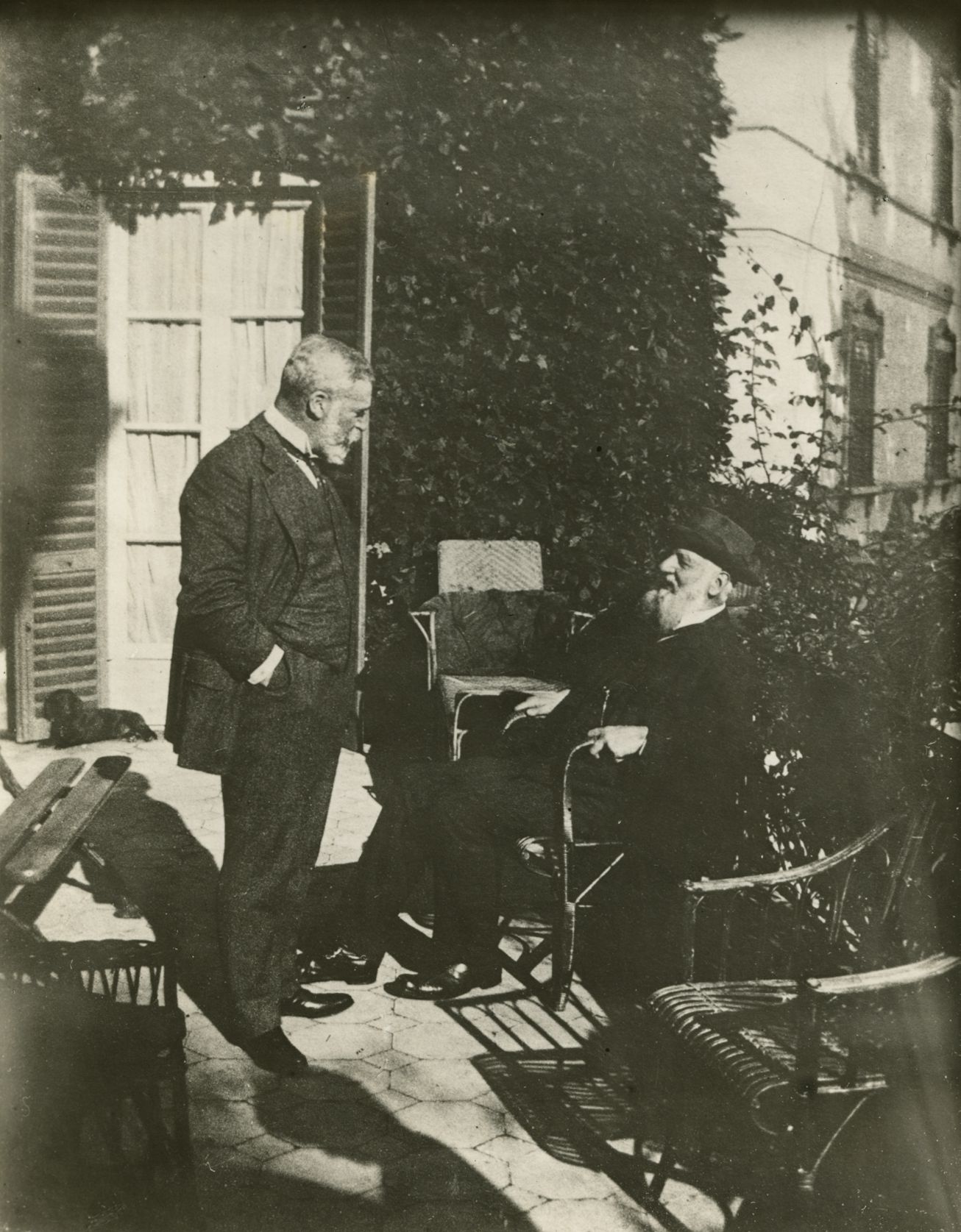- Ukraine crisis: information and assistance
- Forschung Frankfurt
- Research at Goethe University
- 2022/23 winter semester welcome and information
- International
- Netiquette for digital communication @Goethe University Frankfurt
- Mideast Conflict: Information on counseling and support services as well as related guidelines
- Knowledge Transfer at Goethe University Frankfurt
- ContentPage12
- Goethe University Summer Festival | 27 June 2024, from 3.00 p.m. on Westend Campus
- Study
- Faculties
- About the University
- Intranet
- Conflict portal
University history

Goethe University was founded in 1914
Today
With a student enrolment of over 48,000, Goethe University is the third largest university in Germany. In the 2019 Shanghai academic ranking of world universities, it ranks among the top 100-150, and among the top 5-7 within Germany.
2019
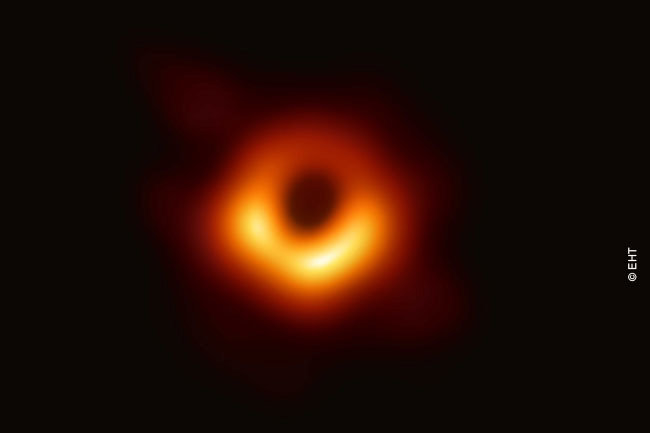
Goethe University astrophysicists contribute to the first image of a black hole, the breakthrough scientific achievement announced by the Event Horizon Telescope Collaboration in April 2019. Simulations carried out by the team headed by Professor Luciano Rezzolla using supercomputers were fundamental for the interpretation of the results.
2018
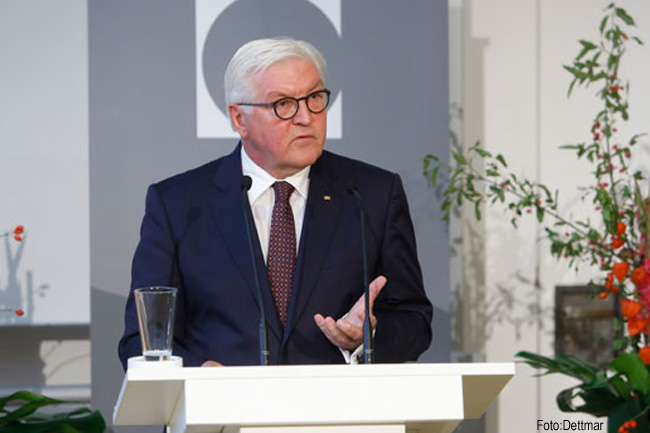
German President Frank-Walter Steinmeier visits Goethe University in September 2018 on the occasion of the German Association for Political Science (DVPW) congress “The Limits of Democracy." In his half-hour talk he recognises the important role Goethe University has played historically in the social sciences, and encourages more active involvement of political scientists in public debates.
2017
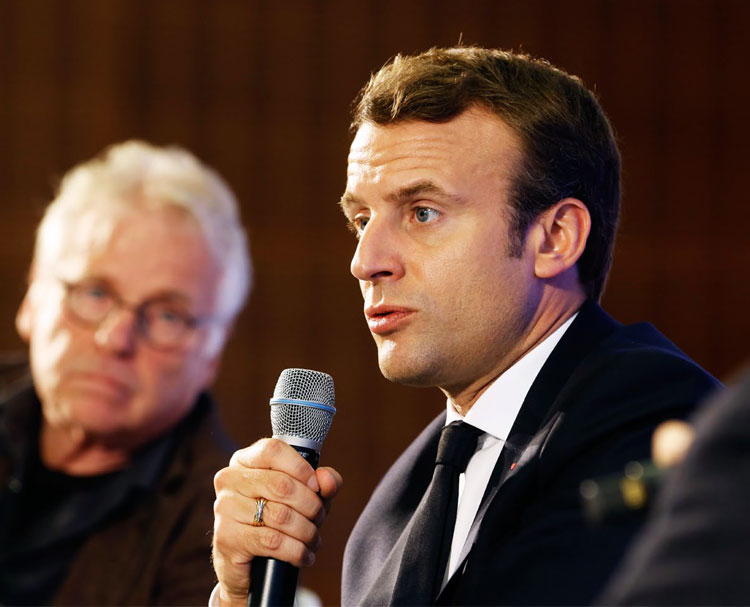
France's President Emmanual Macron visits the Goethe University and discusses his vision for Europe with Daniel Cohn-Bendit, Gilles Kepel and Goethe University students.
More from 2017: 2017 Report
2015
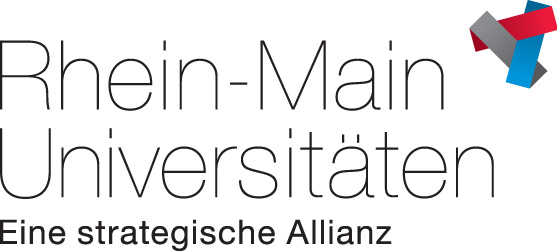
Formation of the Rhine-Main University Alliance: Goethe University, Johannes Gutenberg University Mainz and Technische Universität Darmstadt form a strategic alliance, collaborating in research, teaching, continuing education and the exchange of ideas.
More from 2015: 2015 Report (German)
2014
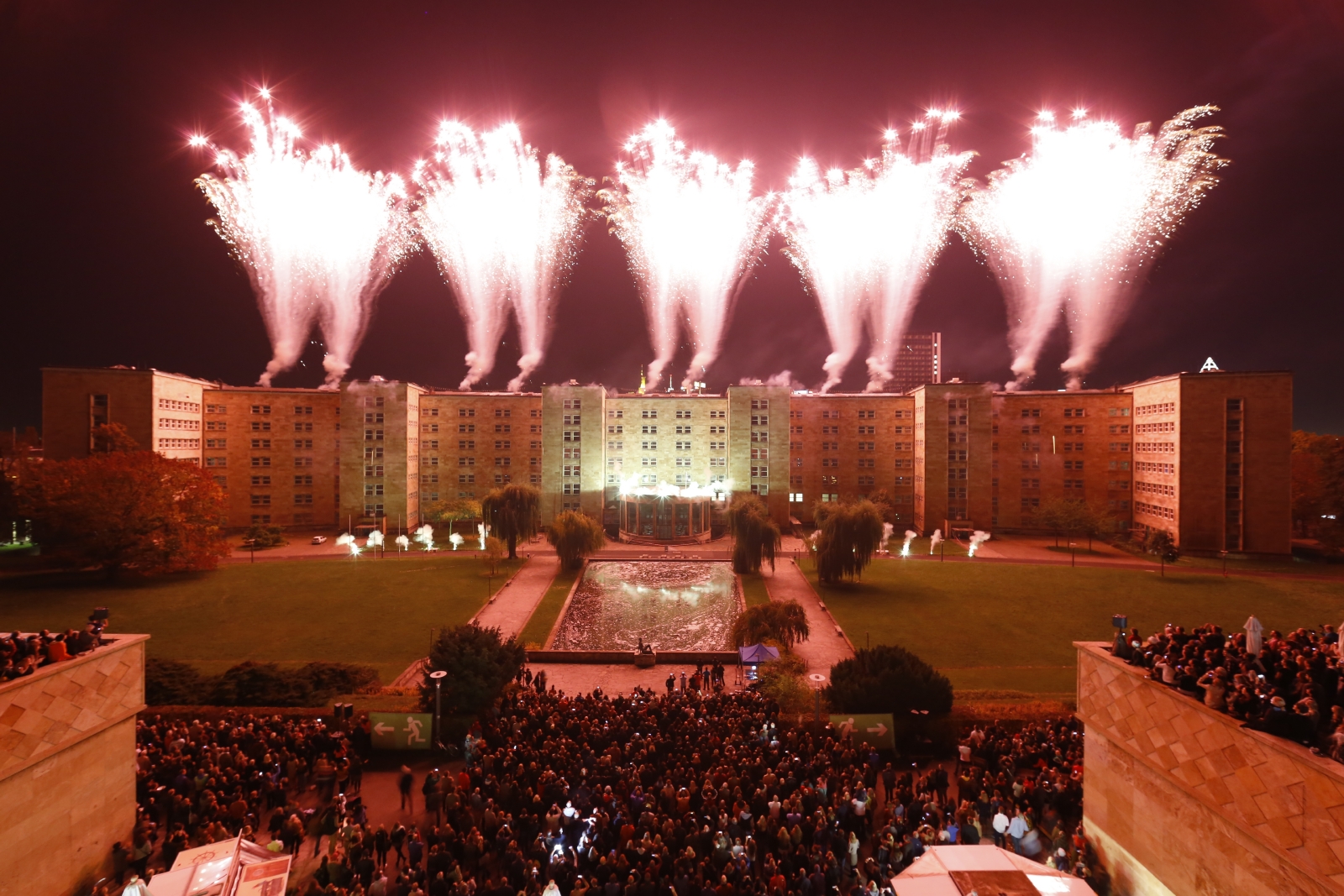
Goethe University celebrates its 100th anniversary. The centenary celebration programme covering the whole year featured more than 100 events. Official ceremonies included the Mayor's New Year reception for Goethe University, and the official centenary ceremony with Federal President Joachim Gauck in the Paulskirche on 18 October 2014. This was followed in the evening by large celebrations on Campus Westend and ended with a magnificent firework display.
More from 2014: 2014 Report
2013
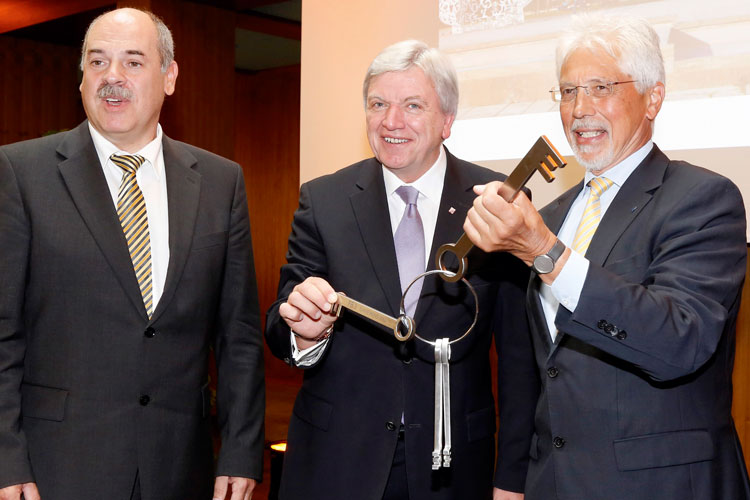 The development of the Westend Campus and the biggest relocation in
the university's history are largely complete. The Minister President of
the State of Hesse, Volker Bouffier, and University President Prof.
Müller-Esterl, ceremonially open the new buildings of the Faculties of
Psychology, Educational Science, and Social Sciences (PEG) as well as
the Governing Board and the Administration (PA) on Campus Westend.
The development of the Westend Campus and the biggest relocation in
the university's history are largely complete. The Minister President of
the State of Hesse, Volker Bouffier, and University President Prof.
Müller-Esterl, ceremonially open the new buildings of the Faculties of
Psychology, Educational Science, and Social Sciences (PEG) as well as
the Governing Board and the Administration (PA) on Campus Westend.
In addition to university buildings, the House of Finance and the Max Planck Institute for European Legal History are also located on the campus.
More from 2013: 2013 Report
2012
The German Research Foundation (DFG) renews its support for the Clusters of Excellence “The Formation of Normative Orders”, “Cardiopulmonary System”, and “Macromolecular Complexes”. This means a further 75 million euros will have been invested in top university research by 2017.
The philosopher Prof. Rainer Forst, co-spokesperson for the Cluster of Excellence “The Formation of Normative Orders”, is awarded the Gottfried Wilhelm Leibniz prize, endowed with 2.5 million euros, by the German Research Foundation (Deutsche Forschungsgemeinschaft – DFG).
More from 2012: 2012 Report
2011
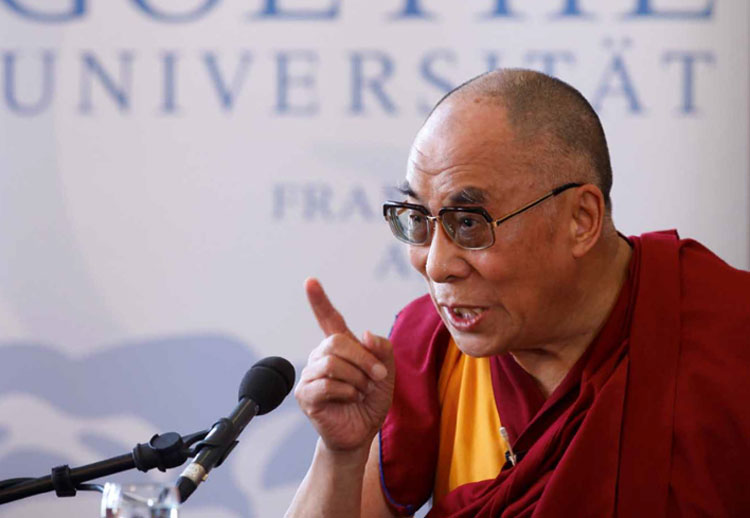
The Dalai Lama speaks to 200 invited guests in the auditorium on the Bockenheim Campus and has over 2,500 online viewers watching the live stream provided by the university computer centre. Goethe University is placed among the world's top 100 universities in the Shanghai rankings for the first time and comes in sixth place among German universities.
More from 2011: 2011 Report
2010
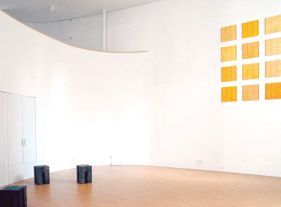
The Haus der Stille (House of Peace) opens on Westend Campus as a place of retreat at GU where members of all religions and cultures can meet to pray, meditate, and spend a moment of silence together.
More from 2010: 2010 Report
2009
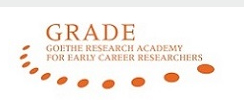
GRADE, the Goethe Graduate Academy, takes up work with an aim to improve the education and research conditions for junior researchers in the natural and life sciences. In the following year the senate decides that GRADE is to become a platform for doctoral candidates from all departments at Goethe University.
More from 2009: 2009 Report
2008
Return to the legal form Stiftungsuniversität: university foundation under public law. Goethe University enjoys greater autonomy and the ability to generate income through endowment funds.
More from 2008: 2008 Report
2006
Goethe University procures three Clusters of Excellence: “Macromolecular Complexes”, “The Formation of Normative Orders”, and “Cardiopulmonary System” (together with the Gießen University). All three are extended by another support period in 2012.
More from 2006: 2006-2007 Report (German)
2005
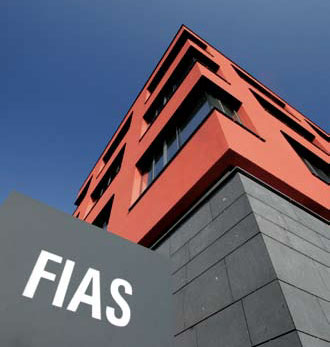 The Frankfurt Institute for Advanced Studies (FIAS) is inaugurated. The
independent research institution serves as a superstructure for basic
research, bringing together theorists from the disciplines of biology,
chemistry, neuroscience, physics, and computer science.
The Frankfurt Institute for Advanced Studies (FIAS) is inaugurated. The
independent research institution serves as a superstructure for basic
research, bringing together theorists from the disciplines of biology,
chemistry, neuroscience, physics, and computer science.
2004
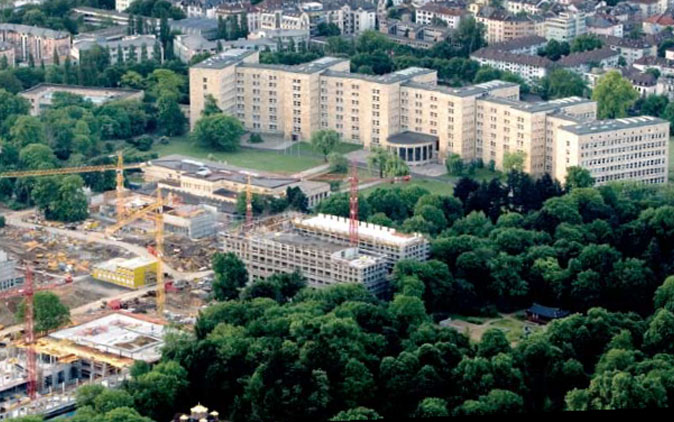 Goethe University wins a commitment of €1.2 billion from the state of
Hessen to create the three campus concept by 2014: Westend (new main
campus), Riedberg (natural sciences), and Niederrad (medicine).
Goethe University wins a commitment of €1.2 billion from the state of
Hessen to create the three campus concept by 2014: Westend (new main
campus), Riedberg (natural sciences), and Niederrad (medicine).
1980s and 1990s
 The university expands to two new locations: Riedberg Campus (natural
sciences) and Westend Campus (humanities). Pictured here: the Biocentre
at the Riedberg Campus.
The university expands to two new locations: Riedberg Campus (natural
sciences) and Westend Campus (humanities). Pictured here: the Biocentre
at the Riedberg Campus.
1970s
A new Hessen-wide university law provides the student body with a stronger voice in university governance, including rights of co-determination in university matters.
Groundbreaking for the new Institute for Chemistry at a location northwest of Frankfurt (completed in 1972).
1968
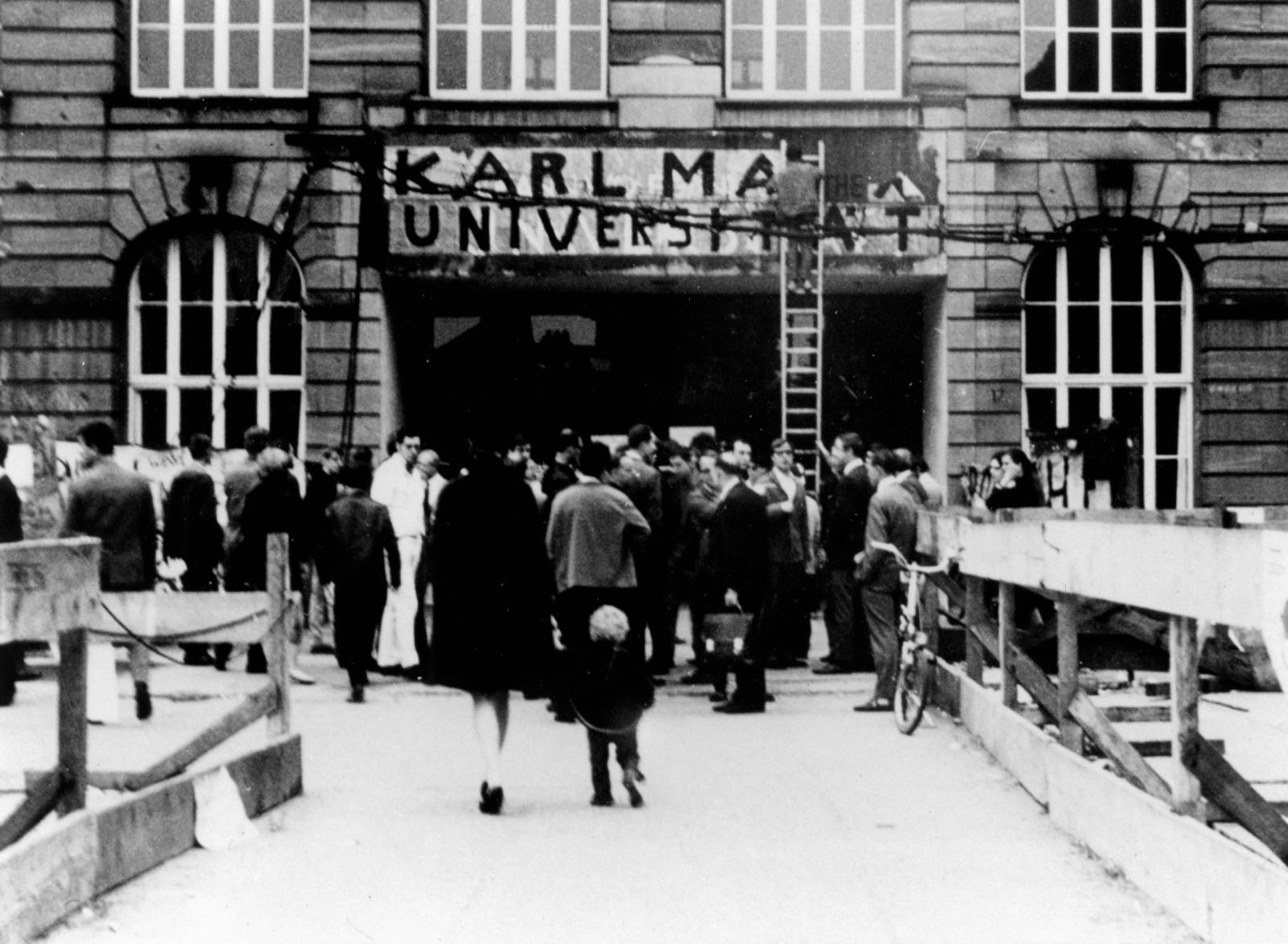
Student protests break out at Goethe University following the attempted assassination of Rudi Dutschke and his call to exert “pressure on the imperialistic USA". The Socialist German Student Union occupies the university. Prominent thinkers of the Frankfurt School become their intellectual role models, albeit partly unwillingly. When the Institute of Social Research is occupied by students in 1969, Adorno has them evacuated by the police.
Image: UAF Abt. 850 Nr. 576
1967
The state of Hesse takes over university funding. The city of Frankfurt had not been able to carry its half of the costs since 1965.
3000 students gather in the summer of 1967 to demonstrate their solidarity with the student Benno Ohnesorge who was shot and killed in Berlin.
1951
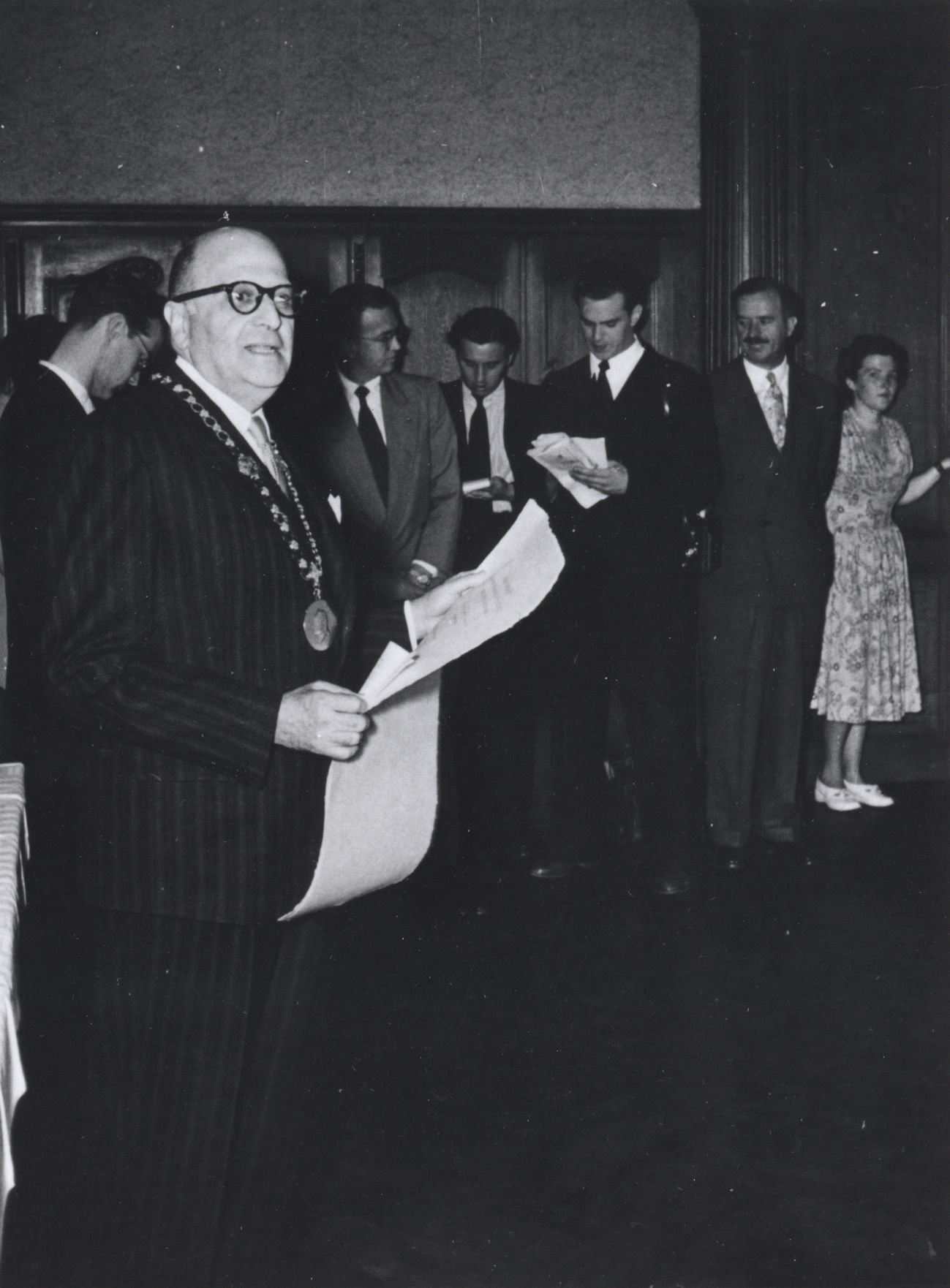
With Max Horkheimer, Theodor Adorno and Friedrich Pollock back in Frankfurt, the Institute for Social Research reopens. Other scientists and scholars also return to Goethe University from exile, such as the economist Fritz Neumark, the biophysicist Friedrich Dessauer, and the physician Oscar Gans.
Image: Max Horkheimer. UAF Abt. 854 Nr. 2115
1946
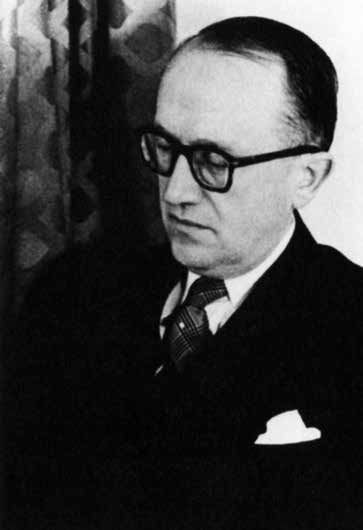
The university reopens after the end of World War II. The first elected rector is Walter Hallstein. In 1958, he became the first president of the European Commission.
Image: Walter Hallstein. UAF Abt. 854 Nr. 488
25. April 1945
18. March 1944
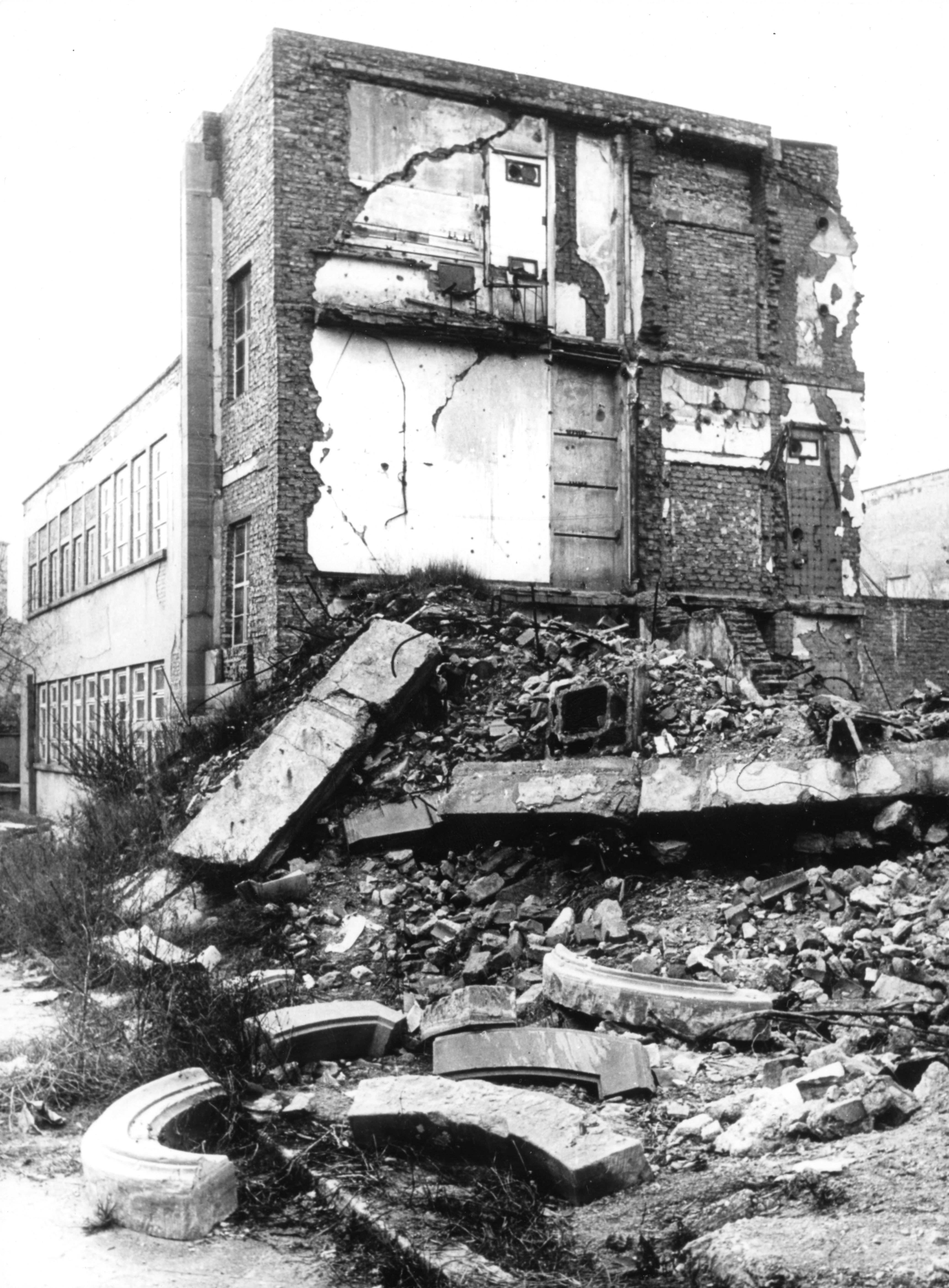
Heavy bombing in the night damages or completely destroys numerous university institutes. The university hospital is hit by over 800 firebombs.
Image: UAF Abt. 850 Nr. 898
1. September 1939
1935
1933
1924
1923
1918
18. October 1914
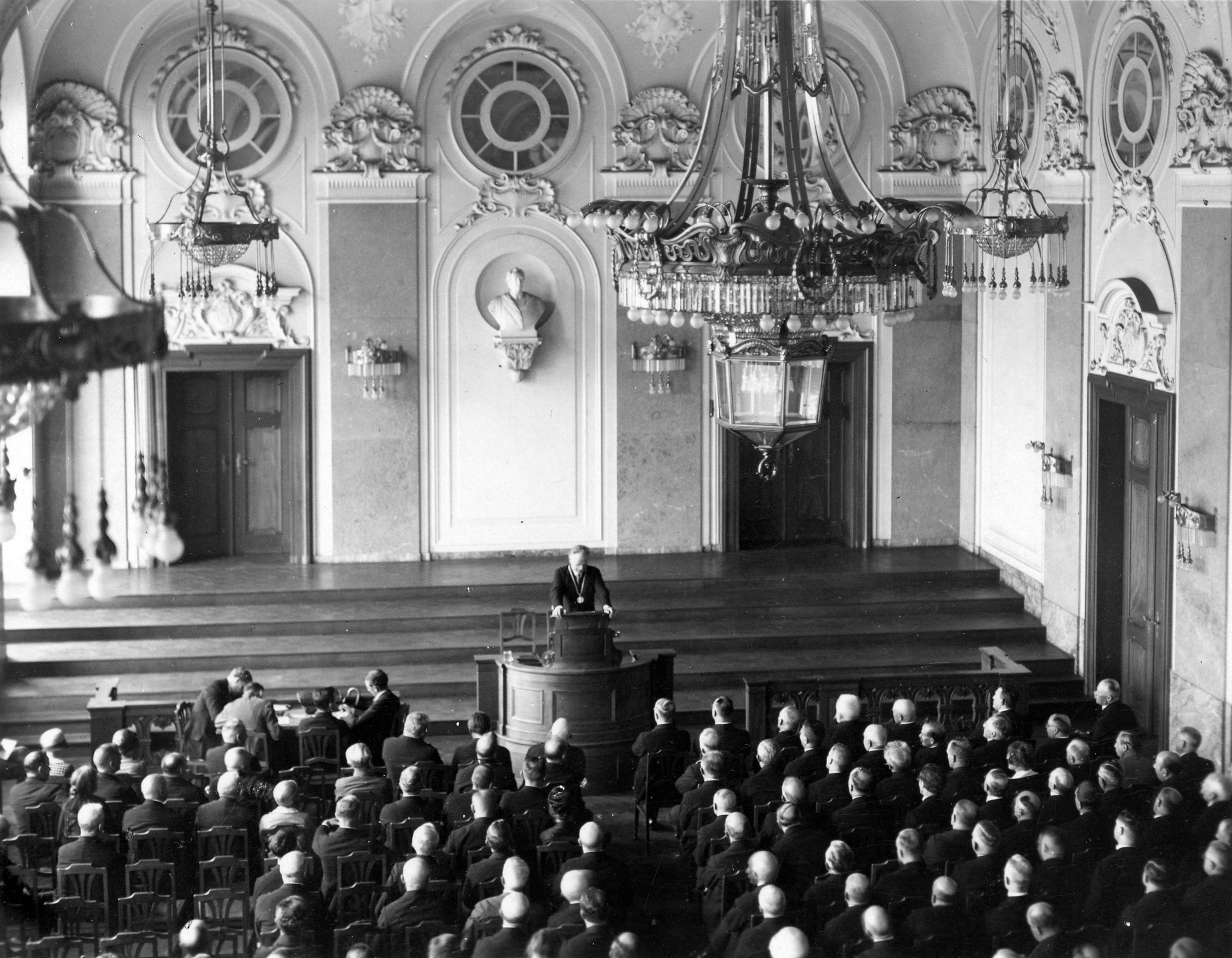
Because of the war, the university opens with a simple speech by the rector Richard Wachsmuth to professors and students in the auditorium and “quietly" takes up its teaching programme.
Image: UAF Abt. 850 Nr. 40
16. October 1914
28. September 1912
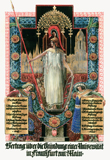 The foundation contract for the “Königliche Universität zu Frankfurt am Main" (Royal University at Frankfurt on the Main) is signed at the Römer,
Frankfurt's town hall. Royal permission is granted on 10 June 1914.
Several scientific facilities are incorporated into the newly founded
Frankfurt University: the Institute of Common Weal, the Academy for
Social and Trade Sciences, the Institute of the Dr Senckenberg
Foundation and the scientific associations proceeding from it - the
Senckenberg Naturforschung Gesellschaft and Physics Union, Ludwig
Edinger's Neurological Institute, the Carolinum Foundation. In addition
to the traditional faculties for medicine, law, and philosophy,
independent faculties for economics and social sciences, and for natural
sciences exist. There is no faculty for theology.
The foundation contract for the “Königliche Universität zu Frankfurt am Main" (Royal University at Frankfurt on the Main) is signed at the Römer,
Frankfurt's town hall. Royal permission is granted on 10 June 1914.
Several scientific facilities are incorporated into the newly founded
Frankfurt University: the Institute of Common Weal, the Academy for
Social and Trade Sciences, the Institute of the Dr Senckenberg
Foundation and the scientific associations proceeding from it - the
Senckenberg Naturforschung Gesellschaft and Physics Union, Ludwig
Edinger's Neurological Institute, the Carolinum Foundation. In addition
to the traditional faculties for medicine, law, and philosophy,
independent faculties for economics and social sciences, and for natural
sciences exist. There is no faculty for theology.
1911 - 1914
- Studying at Goethe University
- International applicants
- Faculties
- Overview of study programmes
- Programme for refugees
- GRADE
- Goethe Business School (continuing education)
- Research at Goethe University
- Scientific news
- Goethe Welcome Center (for international researchers)
- Collaborative research projects
- Individual research
- Visiting fellowships
- Endowed chairs
- About the University
- News-in-brief
- University administration
- Campus locations
- Campus life
- University archives (German)
- Rhine-Main-Universities
